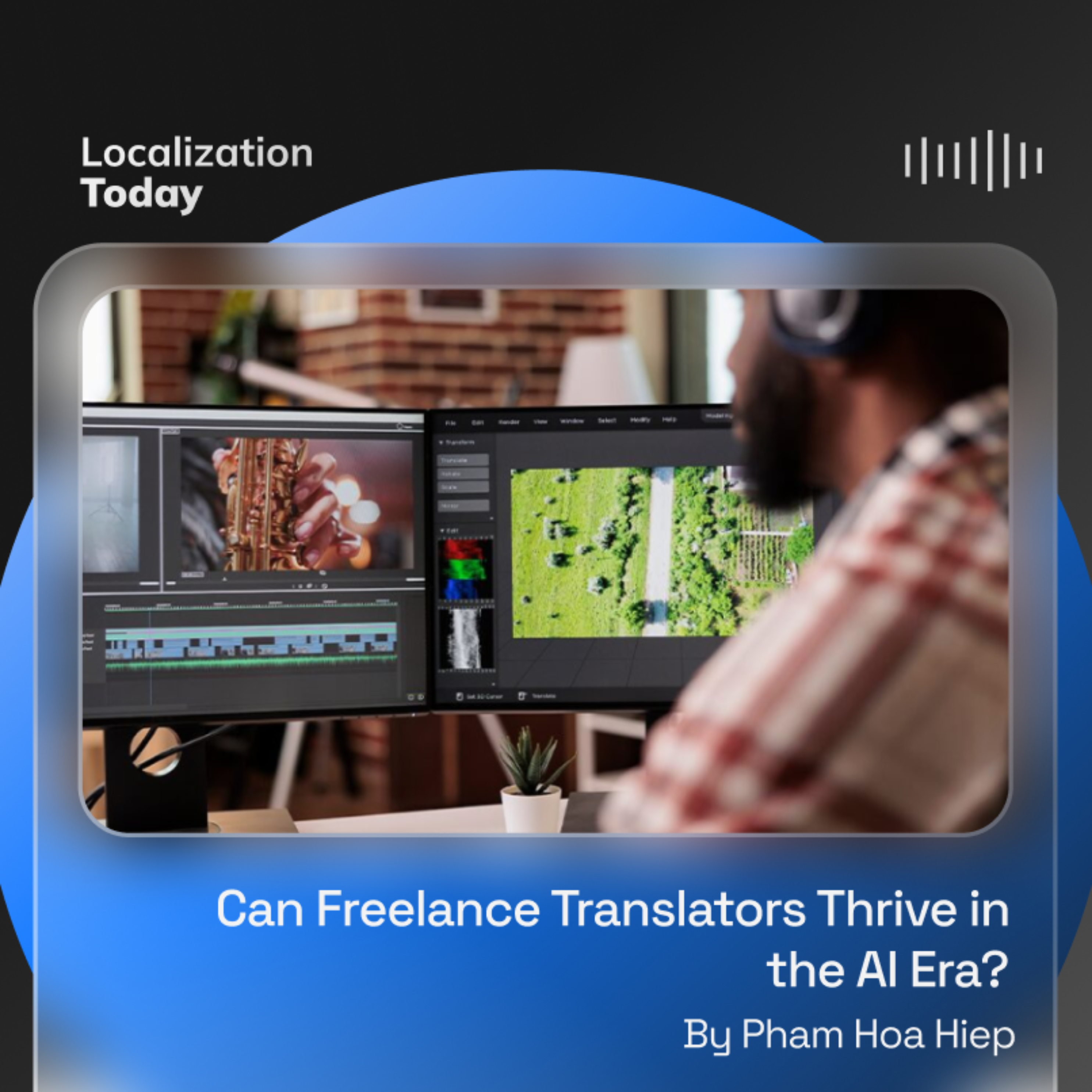Episode Transcript
[00:00:06] Speaker A: This is localization today, a podcast from multilingual media covering the most relevant daily news in the language industry.
[00:00:15] Speaker B: When Alan Turing set his mind to decrypting nazi codes at the advent of.
[00:00:20] Speaker C: World War Two, did he consciously recognize.
[00:00:22] Speaker B: His place in a millennium of scientific development?
What about the humble translators who embraced machine translation during its expansion a half century later, in the 1980s and nineties.
[00:00:36] Speaker C: When they sat down at their MS.
[00:00:37] Speaker B: DOS or Apple computers to fire up the latest software in their computer assisted translation systems? Did they see themselves as inheritors of an intellectual through line tracing back to.
[00:00:49] Speaker C: The ancient Greeks or the abbasids of the Middle Ages?
Whether they knew it or not, and.
[00:00:55] Speaker B: Whether history remem bears their names or.
[00:00:57] Speaker C: Not, all these individuals were players in.
[00:01:00] Speaker B: A story almost as old as human remembrance itself. One must not be afraid of new ideas when it comes to truly intimidating resumes.
[00:01:08] Speaker C: Its hard to top al kindi, a polymath through and thruff, he wielded the.
[00:01:13] Speaker B: Kind of insatiable intellectual curiosity characteristic of historys greatest scientific achievers, from Isaac Newton to Albert Einstein. According to Henry Corbyns History of islamic.
[00:01:25] Speaker C: Philosophy, he wrote 32 books on geometry, 22 on medicine and philosophy, nine on logic and twelve on physics, producing at.
[00:01:34] Speaker B: Least 260 books over a lifetimes.
[00:01:37] Speaker C: Body of work a member of the arab tribe of the kinda, al Kindi.
[00:01:42] Speaker B: Enjoyed a privileged upbringing as a member.
[00:01:44] Speaker C: Of his tribal aristocracy, his father being the governor of Basra with the eras best educational resources at his disposal, according to Corbin.
[00:01:54] Speaker B: He then went on to complete his.
[00:01:56] Speaker C: Studies in Baghdad where, recognizing his talents.
[00:01:59] Speaker B: His educators appointed him to the House.
[00:02:01] Speaker C: Of Wisdom, a crucible of middle Ages era learning. Established in the 8th century, the House.
[00:02:08] Speaker B: Of Wisdom was a thriving intellectual bastion.
[00:02:11] Speaker C: By al kindis lifetime, estimated to be between 801 and 873 c. Access to.
[00:02:18] Speaker B: These elite institutions is likely what exposed the budding scholar to the works of.
[00:02:23] Speaker C: The ancient greek philosophers, a keelink in an intellectual chain that persists authorities of the time, leading to a lonely death.
[00:02:31] Speaker B: In Baghdad by the late 9th century.
[00:02:34] Speaker C: And according to Peter Adamson, professed soar.
[00:02:36] Speaker B: Of late ancient and arabic philosophy at.
[00:02:39] Speaker C: Ludwig Maximilian University of Munich, he was at one point beaten and his library confiscated.
[00:02:46] Speaker B: Alcindys at times bitter life resulted in a perspective about personal attachments not dissimilar to Robert de Niros care actor Neil McCauley in the classic heist film heat.
[00:02:57] Speaker C: Dont let yourself get attached to anything.
[00:02:59] Speaker B: You are not willing to walk out on in 30 seconds flat if you feel the heat around the corner.
[00:03:05] Speaker C: The famous movie line is almost a direct echo of al kindis own words. The lesson to draw may not be.
[00:03:11] Speaker B: That we should avoid forming attachment entirely, but that we should do so sparingly.
[00:03:16] Speaker C: And only for good reason, the scholar wrote.
[00:03:19] Speaker B: Perhaps due to his frequent impopularity in.
[00:03:22] Speaker C: His own age, most of al kindis work has been lost to time.
[00:03:26] Speaker B: According to Felix Klein Franks 2001 book.
[00:03:29] Speaker C: Hal Kindi, what surviving works we possess.
[00:03:32] Speaker B: Can largely be credited to Gerard of Cremona, a 12th century italian translator from Arabic into Latin and a central figure in the famed Toledo school of translators.
[00:03:43] Speaker C: Indeed, translation is a binding theme throughout the life of al Kindi. The House of wisdom, which shaped and.
[00:03:50] Speaker B: Disciplined his mind, was itself a center for the translation of ancient greek literature into Arabic.
[00:03:56] Speaker C: His own work, or what survives of it, is available thanks to italian translators.
[00:04:02] Speaker B: And translators of the modern era, still benefit from al kindis ideas in ways.
[00:04:06] Speaker C: He could never have imagined. Count the occurrences of each letter.
[00:04:10] Speaker B: As Quinn Dupont observes in his article the cryptological origins of machine translation, theys a fundamental link between cryptology and translation.
[00:04:20] Speaker C: After all, both are fundamentally about decoding.
[00:04:23] Speaker B: An indecipherable text, whether by design or.
[00:04:26] Speaker C: By language barrier, and making its meaning plain.
[00:04:30] Speaker B: But prior to academic discoveries in the.
[00:04:32] Speaker C: 1980S, the prevailing historic narrative pointed to.
[00:04:36] Speaker B: An origin of Mt in the 16th and 17th centuries.
[00:04:40] Speaker C: More recent scholarship challenges that I complicate.
[00:04:44] Speaker B: And extend this narrative of machine translatan by tracing it through a longer history of cryptanalysis. This history begins before the western precursors in the 16th and 17th centuries and.
[00:04:56] Speaker C: Distinguishes itself from these latter efforts, which were largely cryptographic, involving encryption, decryption, and not necessarily cryptanalytic. Dupont writes during the so called Islamic Golden Age, a somewhat problematic catch all term denoting a period of intellectual vibrancy.
[00:05:15] Speaker B: From roughly the 8th to 13th centuries.
[00:05:18] Speaker C: Of the common era, arabic scholars possessed.
[00:05:21] Speaker B: The suitable intellectual and political skills and the necessary motivations for the development of cryptanalysis.
[00:05:27] Speaker C: Dupont continues later in his article, citing the late David Cahn, perhaps the most.
[00:05:33] Speaker B: Respected scholar on the history of cryptography, Dupont suggests that the nature of the.
[00:05:38] Speaker C: Arabic political state, the evolution of its bureaucracy, the sophistication of its mathematics, and.
[00:05:44] Speaker B: The cultural reverence for language, among other factors, all contributed its influence on translation and cryptography.
[00:05:52] Speaker C: According to Mohammed I al Suwail of.
[00:05:55] Speaker B: King Abdulaziz City for Science and Technology, Khan based his assertion on references within historical documents to a book by 14th.
[00:06:03] Speaker C: Century scholar Ali Ibn ad Duray, him mifu a q nus fi e d al Marmuz, or key to treasures on clarifying ciphers. But can you take a reference in.
[00:06:14] Speaker B: A historic manuscript at face value.
[00:06:17] Speaker C: That was the question before 1980, and.
[00:06:20] Speaker B: It kicked off an international scavenger hunt.
[00:06:22] Speaker C: In 1979, Drs. M.
Al Tayyn from the Arab Academy of Damascus decided to verify the truth.
[00:06:33] Speaker B: Of Khans statement and look for Ibn.
[00:06:35] Speaker C: Ad Durayams lost book, al Suwa said in a 2018 presentation, Doctor Mariadi and.
[00:06:42] Speaker B: His team discovered a treasure.
[00:06:44] Speaker C: Not only did they find Ibn ed Duraims book, but they also discovered more.
[00:06:49] Speaker B: Than 15 arabic manuscripts on cryptology written by arab scholars in the 9th to 15th centuries AD. Among that treasure trove of historical texts was al kindis treatise on deciphering cryptographic messages.
[00:07:03] Speaker C: And suddenly, a new world of science history revealed itself hits the oldest extant.
[00:07:08] Speaker B: Manuscript on cryptanalysis written in the 9th century AD.
[00:07:12] Speaker C: Also, Wiles said in his presentation, the.
[00:07:15] Speaker B: Manuscript is about 1200 years old. What al Kindi pioneered in his treatise was essentially an early version of the code breaking technique called frequency analysis.
[00:07:25] Speaker C: Among other principles, he described the process as one way to solve an encrypted message. If we know its language is to.
[00:07:34] Speaker B: Find a different plaintext of the same language long enough to fill one sheet or so.
[00:07:39] Speaker C: And then we count the occurrences of each letter.
[00:07:41] Speaker B: We call the most frequently occurring letter.
[00:07:43] Speaker C: The first, the next most occurring letter.
[00:07:46] Speaker B: The second, the following most occurring letter.
[00:07:48] Speaker C: The third, and so on, until we.
[00:07:50] Speaker B: Account for all the different letters in the plaintext sample. Then we look at the ciphertext we.
[00:07:55] Speaker C: Want to solve and we also classify its symbols, al kindi continued.
[00:08:00] Speaker B: We find the most occurring symbol and change it to the form of the.
[00:08:03] Speaker C: First letter of the plaintext sample.
[00:08:05] Speaker B: The next most common symbol is changed.
[00:08:08] Speaker C: To the form of the second letter.
[00:08:10] Speaker B: And the following most common symbol is change to the form of the third.
[00:08:14] Speaker C: Letter, and so on, until we account.
[00:08:16] Speaker B: For all symbols of the cryptogram we want to solve. By analyzing the frequency of letters in an arabic text of 3667 letters, he established a framework for identifying patterns and decoding texts, thus laying the groundwork for both cryptography and empty. Al Kindi noted how common words or phrases, such as the traditional opening for.
[00:08:39] Speaker C: Islamic works, in the name of God, the compassionate, the merciful, could be used as a guide throughout the cryptogram, Dupont wrote. That is, if a cryptanalyst could find.
[00:08:49] Speaker B: Ciphertext corresponding to certain common or probable.
[00:08:53] Speaker C: Words or phrases, guesses could be made to reveal the corresponding plaintext letters, which.
[00:08:59] Speaker B: May also reveal a key or common.
[00:09:01] Speaker C: Substitution used throughout those who have contributed much truth.
[00:09:04] Speaker B: It's difficult to overstate how the principles laid out by al kindi in the 9th century have shaped life today. Cryptanalytic systems and technologies underpin our financial.
[00:09:14] Speaker C: Transactions, Internet use, communications, and, of course.
[00:09:19] Speaker B: The translation systems that professional linguists rely upon every day. And the thought that its origins can be traced back to inquiring minds who lived and worked over 1200 years ago is extraordinary.
[00:09:31] Speaker C: From our limited human perspective, it's impossible.
[00:09:34] Speaker B: To understand how our thoughts and actions will ripple beyond our mortal constraints.
[00:09:39] Speaker C: That's a truly humbling notion, albeit one.
[00:09:42] Speaker B: That supplies valuable perspective and clarity.
[00:09:44] Speaker C: If nothing else, we can at least look back with gratitude at the bright.
[00:09:48] Speaker B: Lights who set the foundations of the modern world. And that's a perspective al kindi himself would likely embrace. He found inspiration and insight in the.
[00:09:57] Speaker C: Ancient greek thinkers he studied, an intellectual.
[00:10:00] Speaker B: Debt he acknowledged in his own work.
[00:10:02] Speaker C: It is proper that our gratitude be.
[00:10:04] Speaker B: Great to those who have contributed even.
[00:10:06] Speaker C: A little of the truth, let alone to those who have contributed much truth, since they have shared with us the fruits of their thought and facilitated for us the true yet hidden inquiries, in.
[00:10:18] Speaker B: That they benefited us by those premises which facilitated our approach as to the.
[00:10:22] Speaker C: Truth, Al Kindi wrote. If they had not lived, these true.
[00:10:26] Speaker B: Principles with which we have been educated towards the conclusions of our hidden inquiries would not have been assembled for us, even with intensive research throughout our time.
This article was written by Cameron Rasmussen, a senior writer and editor for multilingual media.
[00:10:44] Speaker C: Originally published in multilingual magazine, issue 227, April 2024.
[00:10:51] Speaker A: Thank you for listening to localization today. To subscribe to multilingual magazine, go to multilingual.com, subscribe.


